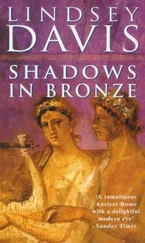Lindsey Davis - Rebels and traitors
Здесь есть возможность читать онлайн «Lindsey Davis - Rebels and traitors» весь текст электронной книги совершенно бесплатно (целиком полную версию без сокращений). В некоторых случаях можно слушать аудио, скачать через торрент в формате fb2 и присутствует краткое содержание. Жанр: Исторические приключения, на английском языке. Описание произведения, (предисловие) а так же отзывы посетителей доступны на портале библиотеки ЛибКат.
- Название:Rebels and traitors
- Автор:
- Жанр:
- Год:неизвестен
- ISBN:нет данных
- Рейтинг книги:4 / 5. Голосов: 1
-
Избранное:Добавить в избранное
- Отзывы:
-
Ваша оценка:
- 80
- 1
- 2
- 3
- 4
- 5
Rebels and traitors: краткое содержание, описание и аннотация
Предлагаем к чтению аннотацию, описание, краткое содержание или предисловие (зависит от того, что написал сам автор книги «Rebels and traitors»). Если вы не нашли необходимую информацию о книге — напишите в комментариях, мы постараемся отыскать её.
Rebels and traitors — читать онлайн бесплатно полную книгу (весь текст) целиком
Ниже представлен текст книги, разбитый по страницам. Система сохранения места последней прочитанной страницы, позволяет с удобством читать онлайн бесплатно книгу «Rebels and traitors», без необходимости каждый раз заново искать на чём Вы остановились. Поставьте закладку, и сможете в любой момент перейти на страницу, на которой закончили чтение.
Интервал:
Закладка:
'Plenty of apprentices fail to stay their term,' muttered Gideon glumly.
'Not in our family!' John must be forgetting wastrel cousin Tom, Gideon scoffed to himself. Tom Jukes tried a new occupation every year and the only one he ever liked was going to the bad… Sympathetically, his father offered, 'You must stay for a month, to try it thoroughly. Then if your heart cries out strongly, you may come and consult me.'
'A month!'
The boy had revealed how homesick he was. To overcome the tug on his emotions, Jukes senior summoned back the printer. Allibone gave no sign of his own misgivings. Gideon was the first apprentice he had been able to take on, and he was anxious that things should not go awry. He satisfied John Jukes eventually, soothing him with a free almanac and a proposal that Jukes should compose an encyclopedia of spices for publication. Robert Allibone was a sharp businessman despite his reserved manner; he had recognised in Gideon's father a man of many projects — though perhaps he had not realised how frequently John's projects were left incomplete.
'Well, Gideon, your mother has sent you some jumbles.'
A packet of cinnamon-flavoured pastry twists was handed over and Gideon went back to work. John Jukes made his farewell; Allibone noticed that he brushed away a tear. Gideon, too, wiped his inky nose on his shirtsleeve.
Those first jumbles were hidden away and eaten in secret, but within the month Gideon opened up, so when his mother sent him treats he would share them. Margery Allibone, a brusque woman, older than her husband, whose cooking was merely adequate, once asked if Gideon's mother would pass on the jumbles recipe. The printer went further. Cookery books, herbals and household manuals were favourites with the public; he nagged for Parthenope to compile a Good Housewife's Closet, which he could illustrate with woodcuts and sell to anxious brides. But Parthenope was about to acquire a daughter-in-law, Lambert's wife, and felt the need to preserve her position by guarding her knowledge. When the Jukes wanted to be gracious to the Allibones, they sent raisins or Jamaica pepper.
Gideon stayed out his term. For the full seven years of his indenture, he was a typical apprentice: clumsy, scatterbrained and sleepy. He went from delivering parcels to operating the press, learning the tricks and pitfalls. He was taught that typography was critical; for hours he sat at the high compositing desk, mastering fast use of the box of type, with vowels in the middle compartments, frequent consonants next and X, Y and Z at the outer edges. He learned how to tighten the form so the lines of type were clenched fast, how far to turn the lever to lower the press — first once, then again for the second page — how to regulate the amount of ink on the pad, how long the wet sheets needed to dry. He watched how Allibone negotiated with the Stationers' Company who registered books and controlled publication; how he commissioned work from authors, both professional and amateur; how he extracted debts from dilatory clients; how he organised bookbinders; how he kept a careful list of decent importers of paper, and ink and pen suppliers; how he handled people begging him to print subject matter he disapproved of (which was very little) or knew he could not sell (rather more).
Gideon was paid nothing, but had freedom to read. If he had a fault as a worker, it was his tendency to get caught up in the words. Correctly setting and spacing the text was hard enough, without losing his place as he read on obliviously through the manuscript pages. Many a time Robert Allibone threatened to show him what it was like to have a harsh master who beat him — though, being addicted to reading himself, he never did.
For anyone interested in politics, there would soon be no better trade. However, at first the outlook for printers was poor, and it grew worse before it got better. Censorship prohibited publication of all foreign and domestic news. Then in 1637, three years after Gideon's indentures, the King's Star Chamber issued a draconian Decree concerning Printing. This aimed to suppress seditious books, particularly those which did not accord with the High Church ideals of the reforming new Archbishop of Canterbury, William Laud. It insisted on registration of all printed works by the Stationers' Company. Fines for seditious authors were reinforced by fines for their printers; Allibone somehow escaped penalties, but it was an anxious period.
Then, another four years later, when King Charles was forced to call a Parliament, the Star Chamber was abolished. At once, printers began selling books without official registration. Pamphlets and news-sheets immediately flourished; every Fiery Counterblast bred a Witty Riposte. Anyone with a burning cause could promote his opinions, whether he brazened it out openly, hid under a false name or tantalised with his initials only.
By chance, Gideon Jukes had been positioned right at the heart of this. He finished his apprenticeship, at the age of twenty, the same year that the King would at last summon a Parliament. He had seen the old regime; now he experienced a great rush of excitement at the new.
One of the first decisions Gideon then made as an adult was to join the London Trained Bands.
England had no standing army. Trained Bands had been established by Queen Elizabeth. They were local militias, where men were drilled every summer in the use of pike and musket in order to defend the realm against foreign invasion. Generally viewed as a joke, poorly equipped, badly trained and liable to desert, in most of the shires the Trained Bands were truly inefficient though in London the situation was different. The London Trained Bands were greatly superior.
Gideon's father was an enthusiast; he had been a captain of the Artillery Company, the high-minded theorists of the Trained Bands, for as long as Gideon could remember. Once a month in summer John would put on a buff coat and collect his weapons. He would proudly march off to an enclosed piece of ground on the western edge of Spitalfields, the Artillery Garden, where the company met to practise under the guidance of hired professional soldiers. Jukes and his comrades read up old campaigns and composed passionate military treatises. None had ever fired a shot in anger. All were convinced they were experts. After the thrill of parading, these companionable hobbyists always adjourned to an alehouse. Their feasts were legendary; the utensils, plates and tureens they used for dining were their most tenderly guarded equipment.
Lambert Jukes was an enthusiastic regular of the Trained Bands' Blue Regiment. He too revelled in wearing uniform, firing practice shots, and drinking with comrades after drill. 'You are just weekend warriors!' grumbled Gideon. 'Posturing amateurs. Your bullets have no bite.'
Membership of the Trained Bands was compulsory for householders, though they were allowed to send substitutes and many instructed an apprentice or servant to attend for them. Deep political foreboding made Allibone attend training sessions in person. He was in the Green Regiment, which Gideon began to eye up warily.
London was astir. In 1641 Gideon was released from his indenture, a qualified journeyman printer. Taller and less thickset than his older brother, he was now nonetheless strong — toned by working the press and shouldering paper bales. He had the square features, pale skin and fair hair that ran in his family, suggesting that if Viking raiders had not made their mark in the remote past, at least Swedish or Danish seamen had been spreading joy among the ladies of medieval or Tudor London. Allibone had made him a good all-round printer, although he would never be a perfect compositor. 'Your thoughts wander! What are you dreaming of?'
Calm and good-natured, Gideon merely smiled. He felt diffident of discussing it but was wondering what his future could be, a second son without a patron, passed fit to be a journeyman but with no money to start up in business.
Читать дальшеИнтервал:
Закладка:
Похожие книги на «Rebels and traitors»
Представляем Вашему вниманию похожие книги на «Rebels and traitors» списком для выбора. Мы отобрали схожую по названию и смыслу литературу в надежде предоставить читателям больше вариантов отыскать новые, интересные, ещё непрочитанные произведения.
Обсуждение, отзывы о книге «Rebels and traitors» и просто собственные мнения читателей. Оставьте ваши комментарии, напишите, что Вы думаете о произведении, его смысле или главных героях. Укажите что конкретно понравилось, а что нет, и почему Вы так считаете.












